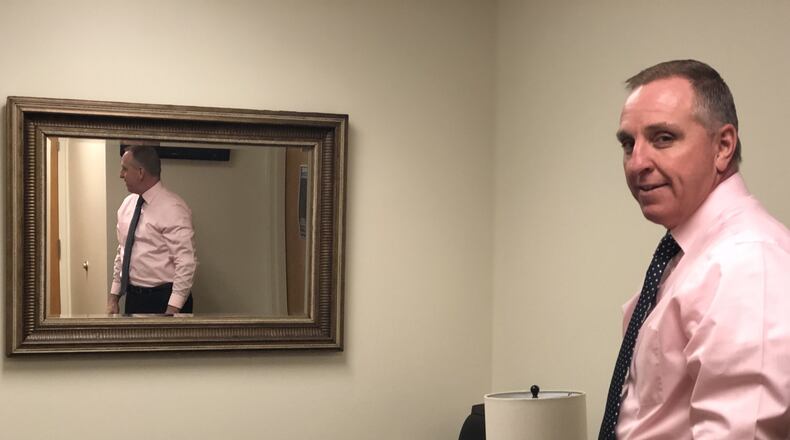But victim advocates believe only a fraction of sexual assaults and rapes are reported to police and law enforcement.
MORE: Not just Hollywood: Sexual harassment complaints up in Ohio
National publicity around high-profile sexual assault victims and accused perpetrators touched off what has been called the #MeToo movement in the past two years. Victim advocates believe that has emboldened more victims to and bring sexual abuse and misconduct complaints forward.
“Whenever survivors feel empowered and supported, they are typically more willing to seek out help,” said Caitlin Bentley, sexual assault program manager with the YWCA Dayton.
MORE: UD student reports sexual assault in campus neighborhood
Last year, the Dayton Police Department received 225 reports of forcible rape, up from 167 in 2017, according to police data obtained by this newspaper.
There also was in increase in people reporting older sex crimes.
Last year, 35 of the rape reports filed were accusations of crimes that were committed in prior years. In 2017, police received 11 reports related to rapes that occurred in previous years.
Police also experienced a 33 percent increase in reports of forcible fondling crimes last year.
“We do ask victims that if something like this has happened to you, be it now or the past, please come forward and share it with us,” said Dayton police Major Brian Johns, commander of investigations and administrative services. “What we see is that people who do these heinous crimes usually don’t stop on their own. It takes them being arrested for the violence against women to stop.”
Impact of Sexual Assault publicity
The #MeToo hashtag became common on Twitter on Oct. 15, 2017, when it was used by actress Alyssa Milano in response to the accusations that Hollywood producer Harvey Weinstein had a history of sexual misconduct , according to the Pew Research Center.
In less than one year, the hashtag was used more than 19 million times on Twitter.
Since late 2017, many people who said they were victims of abuse have come forward .
Police departments in other cities have reported increases in sexual assault allegations as well.
A December report by the U.S. Bureau of Justice Statistics found that sexual assault victims were more willing to report their crimes in 2017. Based on surveys, the report found that of all rapes and sexual assaults that occurred, 23 percent were reported to law enforcement in 2016 but 40 percent were reported in 2017.
Despite the increase, rape and sexual remained the most under reported violent crime in the nation, the survey data show.
That report found nationwide the number of rapes and sexual assaults reported in 2017 were 393,000. That is up from 2016 (298,000), but down from 2015 (431,000).
MORE: Ohio lawmakers to vote today on rape kit tracking system for victims
A ‘victim-centered approach’
Major Johns said it can be intimidating for victims to come forwar to report sexual violence; recounting the details to detectives or investigators can make the victims relive the trauma.
Johns said that is why Dayton police will do what it can to make the process as easy and “victim-centered” as possible.
The department has redone a room in the special victims unit on the second floor of the public safety building to be a more comfortable and private setting to meet with victims, he said.
Police also will come and meet victims out in the community, wherever they feel comfortable, Johns said.
Groups like the YWCA and the Artemis Center can help victims during this difficult time and provide the support they need for dealing with trauma and going through the criminal justice process, Johns said.
Prosecution becomes more difficult the more time that goes by following a sex crime, because some evidence may be lost or depleted, Johns said. But prosecution and charges are still possible, even if the incident was not recent, he said.
MORE: Campus sexual assaults: Many incidents reported, no prison time
Climate changing for victims?
Montgomery County Prosecutor Mat Heck Jr. told this newspaper that more attention in recent years has been given to victim rights, including the treatment of sexual assault victims.
Last year, a Constitutional amendment was passed in Ohio that ensures victims have a voice and receive fair treatment by the criminal justice system, he said.
Police, prosecutors and victim advocates are more responsive and sensitive to these issues, and hopefully more victims will feel empowered by the shift in attitudes and the fact that other victims who have come forward have been believed, Heck said.
“Any fact or circumstance, including the #MeToo movement and current climate, that results in more victims reporting sexual assault or domestic violence is a positive and beneficial result,” Heck said.
MORE: Dayton man, 19, sentenced to nearly 80 years in prison in rape case
Challenges remain
Sexual assaults have been decreasing since the 1990s, falling from about 1 in 3 women being victimized to about 1 in 5, said Bentley, with the YWCA. But,Some fear retaliation or that they won’t be believed. Bentley said three-fourths of victims know or are acquainted with their attacker.
Some victims fear losing their housing or employment or are worried for their physical or emotional safety.
She said the key thing is that survivors are believed and reassured they are not the ones at fault.
“Survivors should be able to choose when and how they share their story,” Bentley said. “People should not feel like they have to come forward or share their story if they don’t wish to. But by creating a culture that is responsive to the needs of survivors, you would naturally see an increase in help-seeking behavior.”
MORE: Dayton man accused of sexual assault, abduction due in court this week
About the Author

